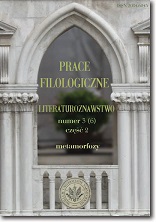Metamorfozy motywów laudacyjnych w epitalamiach. Od greckiego Teokryta do gdańskiego Mollera
Epitalamic laudatory motives in transformation. From Greek Theocritus to Henry Moller, a Neo-Latin poet from Gdańsk
Author(s): Izabela BogumiłSubject(s): Literary Texts
Published by: Wydział Polonistyki Uniwersytetu Warszawskiego
Keywords: epitalamium; motywy laudacyjne; panegiryk; poezja nowołacińska; epithalamion; laudatory motives; panegyric; Neo-Latin poetry
Summary/Abstract: The paper is concerned with the transformation of laudatory motives in the epithalamia, from the earliest extant Greek texts, through the nuptial poetic pieces by Catullus, Statius and Claudianus, down to the wedding poetry from the 16th century. Both, the ancient Greek poets, and Catullus as well, used to introduce the motive of praise with a dose of restraint. In other words, the early Greek and Roman poets were focused on the newly married couple. On the contrary, since the Roman Imperial period, it was intended to make the poetic praise more universal and so the poets used to extend the passages with laudatory motives. Therefore, other topics were added, such as the origin of the spouse and the bridegroom. Henry Moller as a poet was quite excessive in the matter of praise. Frankly speaking, his poetry praises everyone and everything: for instance, family members, both those who died not long ago, and those who are alive (epithalamium for Casper Nefelius and Sophia, Nicolaus Richavius’s daughter); the duchy of Baden and the city of Gdańsk ({Gratulatio Musarum Gedanensium} for Swedish princess Cecilia Vasa and prince Christopher II of Baden); even Jagiellonian king Sigismund II Augustus once became the object of praise, because he was a brother of the female addressee of the poem entitled {Auleum Gratiarum} (besides, Moller interlaced some political suggestions to the Jagiellonian ruler with the verses). It seems typical to Neo-Latin poets to insert the words of praise in the mouth of fictional characters. However, it is evident that the poetic self-esteem was not an unimportant factor. Over time, the authors of Neo-Latin poetry got used to speaking directly to the reader. Some of them were evident and eager flatterers. In general, we can observe that the epithalamic laudatory motives are in constant transformation. Every epoch, or even culture, has its own inventory of laudatory topics and objects.
Journal: Prace Filologiczne. Literaturoznawstwo [PFLIT]
- Issue Year: 2013
- Issue No: 3 (6)
- Page Range: 117-142
- Page Count: 26
- Language: Polish

